"Cash for Clunkers," Appliance Edition. I've been looking forward to Florida's appliance rebate program ever since I first heard rumor of it. Our refrigerator was old when we bought it used in 2001, and I'm sure it uses up much more energy than a refrigerator should. Plus, who knows how long it will last?
Actually, that question is spurious. Our neighbors bought a new, high-end appliance a few years ago and it has required multiple repairs—even while still under warranty—whereas our old clunker is still going strong, albeit with strange nocturnal (and diurnal) noises. Still, you never know.
However, this is no "shop carefully, get the best deal, purchase your appliance, and apply for the rebate" program. (More)
Permalink | Read 2882 times | Comments (0)
Category Everyday Life: [first] [previous] [next] [newest] Conservationist Living: [first] [previous] [next] [newest]
CNN Health reported a study in which rats, allowed unlimited access to bacon, sausage, cheesecake, frosting, and other high-calorie foods, developed brain changes similar to those in rats given free access to cocaine or heroin. People are not rats, the scientists are quick to point out, but the findings are suggestive. I'm not so happy that their goal seems to be developing a pharmaceutical approach to both drug addiction and obesity, but I found the following thought-provoking:
So...Coca-Cola originally had cocaine as one of its ingredients...now it has high fructose corn syrup. No wonder it's so popular. :)The fact that junk food could provoke this response isn't entirely surprising, says Dr.Gene-Jack Wang, M.D., the chair of the medical department at the U.S. Department of Energy's Brookhaven National Laboratory, in Upton, New York.
"We make our food very similar to cocaine now," he says.
Coca leaves have been used since ancient times, he points out, but people learned to purify or alter cocaine to deliver it more efficiently to their brains (by injecting or smoking it, for instance). This made the drug more addictive.
According to Wang, food has evolved in a similar way. "We purify our food," he says. "Our ancestors ate whole grains, but we're eating white bread. American Indians ate corn; we eat corn syrup."
The ingredients in purified modern food cause people to "eat unconsciously and unnecessarily," and will also prompt an animal to "eat like a drug abuser [uses drugs]," says Wang.
 Indoctrinate U (On the Fence Films, 2007)
Indoctrinate U (On the Fence Films, 2007)
Indoctrinate U has been on my "watch list" for a while, but I hadn't been able to make myself take the time. It's not available from Netflix, but I found it on YouTube, in nine parts of about 10 minutes each. Today it came up on my "get this done today" list, so I thought I'd watch one or two of the segments. But they don't end in good places, and anyway I got hooked, so I watched the whole thing.
This documentary on discrimination, intolerance, and anti-diversity in American higher education is obviously not a high-budget film, though I'm sure it's better in the original format. I agree with Janet's comment that "it only pointed out the problems and didn't discuss any causes or better yet, idea for fixing the problems," and fear she may be right that it might be more divisive than helpful. Nonetheless, it's an important film to watch for anyone attending, planning to attend, or sending money to a college or university. I am not advocating staying away from college; but do be aware of the larger picture.
Although the film looks with some nostalgia on university life in the 1960's, there was plenty of intolerance for diversity of thought even then, though it was not, as now, enshrined in the bureaucracy, and the hard sciences (where I was) were mostly free of that, at least as far as the students were concerned. Our professors had a hard enough time teaching us math and physics, and didn't feel that taking time for political discussion would help us understand differential equations any better. I'm told by math professor friends that that has now changed. One, who has taught both in the United States and in Africa, expressed frustration that her American university required her to teach her not only calculus, but also the importance of African mathematics. I'm not sure what "African mathematics" might be that is important for a university math major to learn (I missed it in my classes), but I wouldn't be surprised if in the future the important mathematicians are African—because her African students are eager to learn the content, not the politics, of math.
The investigator for Indoctrinate U has been criticized for his confrontational approach, but while I do think one cannot expect to see a university president without an appointment, as journalists go, he was about as mild and polite as you can get.
Yes, the film is one-sided, and not only because they couldn't get anyone from the university side to talk seriously with them. It presents, however, a side that is not usually heard—indeed, is often censored, mocked, threatened, and attacked—and can be forgiven for being a little strident.
Here is the first segment; from there YouTube will provide links to the remaining eight. Be patient with the first couple, as at least I found the emphasis on affirmative action less interesting than the general topic of free speech on campus, which is more clearly presented in later parts. (There is a small number of profanities—quoting from a threat to a student and from the title of a play—that are bleeped out if you get the "clean" version, but the download versions are unaltered.)
I wish they had made more of a distinction between public and private colleges. To me, there's a huge difference between what a private school chooses to allow or forbid, and what a taxpayer-funded school does. But in either case, if the school is presenting itself as a bastion of diversity, tolerance, and academic freedom, evidence to the contrary needs to be heard. Caveat emptor.
Is there a solution? Confronting the universities with their own stated diversity policies is a start: Janet had some success at her school that way. In the long run, I think the biggest difference will be made by India and the Internet. American universities have long enjoyed near-monopolistic dominance in their field. However, as it did for their manufacturing and information technology counterparts, that privilege is coming to an end. When people have choices, change happens.Janet alerted me to Jamie Oliver; DSTB followed up with what is apparently a new show on ABC. It starts next Friday, but the pilot was shown last night; fortunately it's available both at the show site and Hulu, so I was able to watch it. Jamie's attempt to get the people of Huntington, West Virginia to take a healthier approach to eating has the faults of American commercial television (just as does Who Do You Think You Are?), but it's not bad and (so far) is not as over the top as what I've seen of his British shows. If his personality is a little too dramatic for my taste, there's no doubting the sincerity of his preaching and his mission. His gospel is good, fresh food, and in this episode he takes on school lunches.
[Excuse me, school meals. The only meal these children eat at home is dinner. In Oliver's unfeigned horror at the meals served at our public schools, he misses what strikes me as the more important point: Why are all these children eating school food? Why aren't they bringing lunches from home, and why, for Pete's sake, don't they eat breakfast before going to school? If the schools are going to offer food, certainly it should be healthy food, but where are the parents? There's absolutely no need to subject one's children to American public school food, good or bad. The school lunch (and now breakfast) program does serve a useful purpose, making sure children whose parents can't provide meals for them aren't trying to learn on empty stomachs. That's a good thing. But somehow the whole system got skewed; I know that the goal of the school lunch program at our kids' school was to have everyone participate. (We didn't.) I saw not one lunchbox in the show. I hope that while he teaches the adults how easy it is to put together healthy meals, he also teaches the kids how easy it is to make their own healthy lunches. But that's another issue; I know I'm taking on a Great American Icon by dissing the school lunch program.] (More)
Cleaning out old things, found this Hagar the Horrible comic, probably from last October. (The link is to the current comic; if you can't see the image below—some feedreaders strip images—you'll have to click through to the original post.)
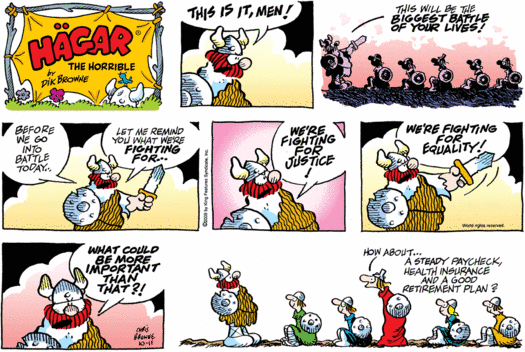
Permalink | Read 2843 times | Comments (0)
Category Random Musings: [first] [previous] [next] [newest]
Today was a wonderful, sunny-but-not-too-hot day, perfect for the Winter Park Sidewalk Art Festival. This is a huge annual event, with artists from all over the country, and Canada, too. Northern states are particularly well represented, but they come for more than the weather, as the presence of David Levy from Davis, California attests.
David Levy. Therein lies a tale.
Many years ago, some good friends from upstate New York gave us a gorgeous cutting board, made of strips of wood in a multi-colored zig-zag pattern. Yes, we do use it as a cutting board, although it was a good two years I think before I could bring myself to set a knife to such beauty. As we were strolling among the booths I suddenly exclaimed to Porter, "That's our cutting board!" The pattern was unmistakable, although I'll admit I actually only thought it was like our cutting board. When we returned home, however, I flipped ours over and read clearly, "David Levy, Davis, CA." California, New York, Florida—this guy gets around.
I wore my Vibram Five Fingers shoes (which will eventually get their own post) and a Carnegie Mellon t-shirt, both of which drew interested comments. Another fun thing was seeing the storefront which when the renovations are complete will house our very own Penzey's!Permalink | Read 3270 times | Comments (0)
Category Everyday Life: [first] [previous] [next] [newest]
Our census form arrived. In a word: B-O-R-I-N-G.
It's a good thing for future genealogists that we have so many other forms of record-keeping, because they won't get much from the 2010 census. Name, sex, date of birth, race in excruciating detail if you're Hispanic, Asian, or Pacific Islander (Dominican? Hmong? Fijian?), relationship to head-of-household (now inoffensively called "Person 1" — also in excruciating detail, distinguishing, for example, between biological and adopted children, which genealogists will love, if no one else). That's only if you're one of the first six people in the household. For Persons 7 through 12 they don't care about your race or exact relationship. And if you're the 11th child in the family? Apparently you're out of luck, but I suspect that may be covered by the "we may call for additional information" caveat that goes with the questions for Persons 7 - 12, since there's also a place to indicate the total number of people in the household.
I wrote before about the interesting information in previous censuses, but I'll repeat it for this occasion. (More)
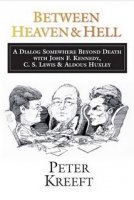
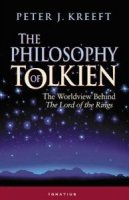 Between Heaven and Hell: A Dialog Somewhere Beyond Death with John F. Kennedy, C. S. Lewis & Aldous Huxley, by Peter Kreeft (InterVarsity Press, Downers Grove, Illinois, 2008)
Between Heaven and Hell: A Dialog Somewhere Beyond Death with John F. Kennedy, C. S. Lewis & Aldous Huxley, by Peter Kreeft (InterVarsity Press, Downers Grove, Illinois, 2008)
The Philosophy of Tolkien: The Worldview Behind "The Lord of the Rings," by Peter Kreeft (Ignatius Press, San Francisco, 2005)
Someone recommended to me Peter Kreeft's Jesus-Shock. But our library doesn't have it, and before ordering it I decided it would be a good thing to sample his books that I could borrow—my previous experience with Peter Kreeft being pretty much limited to the banner we saw at MIT, advertising his upcoming visit. Hence the unexpected addition of two new books to my reading list while there are still so many at home waiting to be read! At least they are short books that didn't take long to read. (More)
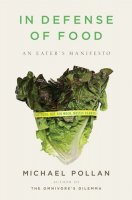 In Defense of Food: An Eater's Manifesto, by Michael Pollan (Penguin, New York, 2008)
In Defense of Food: An Eater's Manifesto, by Michael Pollan (Penguin, New York, 2008)
I'm in the middle (okay, the beginning) of two rather hefty books at the moment, Susan Wise Bauer's The History of the Ancient World, and my latest review book from Thomas Nelson, The Chronological Guide to the Bible. It's great to be reading the two of them together, though that means it will be a long time before I can review either one.
And now longer still, as the library e-mailed to let me know that I'd made it to the top of the waiting list for In Defense of Food. Michael Pollan is shaping up to be the next John Taylor Gatto for me: a modern author whose books I simply can't resist and can't put down. Reading was the easy part; reviewing without quoting from every page is the difficulty. The book is bristling with my neon green and pink sticky notes. (More)
 The Brothers Karamazov, by Fyodor Dostoevsky
(Hovel Audio, read by Simon Vance, abridged by Thomas R. Beyer)
The Brothers Karamazov, by Fyodor Dostoevsky
(Hovel Audio, read by Simon Vance, abridged by Thomas R. Beyer)
I normally don't care for abridged versions of books, but this version was a free download from Christianaudio.com. Since I've never read any of the great Russian novels, as an introduction, it's probably a good thing that this was abridged. If and when I read the actual book, I'll have a better chance of keeping all the characters straight, and of not getting lost in all the diversions. Having heard all the Russian names read aloud will no doubt be helpful, too. This version is 19 1/4 hours long; you can download the full 40-hour version from LibriVox if you'd like. There are also several online versions of the text, including one in the original Russian, if you're so inclined. (More)
Article 1, Section 2 of the U. S. Constitution lays the groundwork for conducting a periodic census in order to provide proportional representation in the House of Representatives.
The House of Representatives shall be composed of Members chosen every second Year by the People of the several States.... Representatives and direct Taxes shall be apportioned among the several States which may be included within this Union, according to their respective Numbers, which shall be determined by adding to the whole Number of free Persons, including those bound to Service for a Term of Years, and excluding Indians not taxed, three fifths of all other Persons....
This was modified somewhat by the 14th Amendment, to wit (More)
It's not a topic I'd intended to blog about, even though I'd read the AP article, Top home-school texts dismiss Darwin, evolution. But I wrote so much in a comment to a friend's Facebook post (thanks, Liz!), I figure it's a shame not to make a second use of the effort.
Our own homeschooling experience left me not particularly impressed with the efforts of specifically Christian publishers, beginning with the discovery that the A Beka kindergarten book I'd bought taught that winter is a time of snow, with no mention of the large part of the world where that isn't true. I suspect most books at the kindergarten level are about as bad, but A Beka is based in Pensacola, Florida, and should have known better. (More)
Not that we're anywhere near January 1, but I seem to have begun a habit of making a new resolution on the 8th of the month, so why not?
If you look at the three I've made so far, it does seem as if I'm working on a book entitled, 12 Joyful Resolutions that Will Change Your Life. Maybe I am. Happy resolutions are so much more fun to keep! Not any easier, however, especially when, like this one, they are vague and not easily measurable.
I was casting around for the next resolution—in fact, I had a couple of others in mind—when this one came to me, out of the blue. It's a good one, though. For more than 25 years, any complaints I bring to a doctor have been met with two responses: (1) you're getting older, and (2) you're under too much stress. The former no resolution will help, but the latter bears examination. It's not so much that my life is stressful—even when it was far more stressful than it is at the moment—but that I let it control me. I react badly to stress, carrying it around in my mind and body, as anyone knows who has given me a shoulder massage. My blood pressure is edging up, too—not a problem yet, but I don't want it to become one. Perhaps when I was younger my body could handle these assaults, but—see #1 above. So it's time to get a handle on stress: to learn to relax. (More)
Permalink | Read 3087 times | Comments (2)
Category Everyday Life: [first] [previous] [next] [newest]
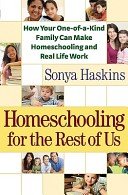 Homeschooling for the Rest of Us: How Your One-of-a-Kind Family Can Make Homeschooling and Real Life Work, by Sonya Haskins
(Bethany House, Minneapolis, 2010)
Homeschooling for the Rest of Us: How Your One-of-a-Kind Family Can Make Homeschooling and Real Life Work, by Sonya Haskins
(Bethany House, Minneapolis, 2010)
Sonya Haskins is a calm and reasonable voice speaking to the homeschooler—and potential homeschooler—who is overwhelmed and intimidated by the image of the "perfect" homeschooling experience: "Matching outfits, polite toddlers, award-winning students, fifteen-passenger vans, and family Web sites." (Raymond and Dorothy Moore did the same thing in the 1980s with Homeschool Burnout, which was updated and revised in the 1990s as The Successful Homeschool Family Handbook.) There's a lot of hype, confusion, and contradictory information out there, and Haskins' practical, back-to-basics approach and helpful suggestions will reassure timid beginners that they can, indeed, safely navigate the homeschooling waters. (More)
Ralph Vaughan Williams: Fantasia on
a Theme by Thomas Tallis
Mozart: Concerto No. 1 for Flute in G Major, K. 313 (285c)
Dvorak: Symphony No. 7 in D minor, op. 70


